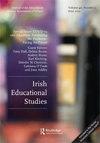Capturing the perspectives of a diverse range of early childhood education and care stakeholders
IF 1.2
4区 教育学
Q2 EDUCATION & EDUCATIONAL RESEARCH
引用次数: 0
Abstract
ABSTRACTCurrent approaches to research in the field of Early Childhood Education and Care (ECEC), in particular in relation to methods designed to interrogate policy and practice developments, tend not to focus on gathering empirical data through collaborative networks. This article provides a critical reflection on a novel qualitative methodological approach to gathering data through engaging participants in a professional conversation that involved a broad community of ECEC stakeholders in the Irish context. This methodology was informed by a professional conversation approach first employed in Queensland, Australia to support the professional learning and development of ECEC leaders in relation to new policy developments (Irvine & Price, 2014). The professional conversation methodology was adapted and expanded to the Irish context and was applied to a series of symposia between 2015 and 2019. Recognising this methodological approach as a way to employ research evidence in and from policy and practice in ECEC and in education more broadly represents an innovation that has the potential to positively impact research, policy and practice knowledge.KEYWORDS: Professional conversationsmethodologyearly childhood education and care Disclosure statementNo potential conflict of interest was reported by the author(s).Notes1 For example, play and creativity, emergent curriculum, meta-cognition and emotional regulation in young children as per www.ecalignment.ie.Additional informationFundingThis work was supported by National Council for Curriculum and Assessment: [Grant Number TBC].Notes on contributorsRhona StallardRhona Stallard is a Lecturer in the Department of Early Childhood Education at Marino Institute of Education, Dublin.Emeritus Noírín HayesNóirín Hayes is Visiting Academic at the School of Education, Trinity College Dublin and Professor Emerita, Technological University Dublin.Ann Marie HalpennyAnn Marie Halpenny is a Lecturer (Rtd) in the School of Social Sciences, Law and Education at Technological University Dublin.收集各种幼儿教育和保育利益攸关方的观点
摘要目前在幼儿教育和护理(ECEC)领域的研究方法,特别是与旨在询问政策和实践发展的方法有关的方法,往往不注重通过协作网络收集经验数据。本文提供了一种新的定性方法的批判性反思,通过参与专业对话,涉及广泛的ECEC利益相关者社区在爱尔兰的背景下收集数据。这种方法是由澳大利亚昆士兰州首次采用的专业对话方法提供的,该方法旨在支持ECEC领导人在新政策发展方面的专业学习和发展(Irvine & Price, 2014)。专业对话方法被改编和扩展到爱尔兰的背景下,并应用于2015年至2019年之间的一系列专题讨论会。认识到这种方法方法是在ECEC和教育的政策和实践中更广泛地运用研究证据的一种方式,这代表了一种创新,有可能对研究、政策和实践知识产生积极影响。关键词:专业对话方法年度儿童教育和护理披露声明作者未报告潜在的利益冲突。注1例如,玩耍和创造力、紧急课程、元认知和幼儿情绪调节,详见www.ecalignment.ie.Additional信息。本研究得到了国家课程与评估委员会的支持:[授权号TBC]。作者简介:肖娜·斯塔拉德肖娜·斯塔拉德是都柏林马里诺教育学院幼儿教育系讲师。荣誉教授Noírín HayesNóirín Hayes是都柏林三一学院教育学院访问学者和都柏林科技大学名誉教授。Ann Marie Halpenny是都柏林科技大学社会科学、法律和教育学院的讲师。
本文章由计算机程序翻译,如有差异,请以英文原文为准。
求助全文
约1分钟内获得全文
求助全文

 求助内容:
求助内容: 应助结果提醒方式:
应助结果提醒方式:


